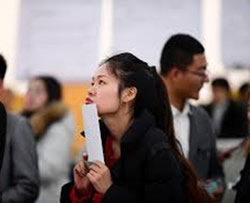 China is planning to increase the size of its Public Service to cope with record numbers of graduate students coming onto a job market reeling from the effects of the COVID-19 pandemic.
China is planning to increase the size of its Public Service to cope with record numbers of graduate students coming onto a job market reeling from the effects of the COVID-19 pandemic.
Around 8.7 million students are graduating this year, almost half a million more than last year, heading into an uncertain future as private firms rein in recruitment.
President Xi Jinping, said unemployed students could cause “negative energy” has told the country’s thousands of State-owned enterprises and Local Governments, as well as national Departments, to expand hiring.
It appears the call has been heeded with State-owned oil company, Sinopec Corp among a number that have doubled 2020 recruitment numbers.
In Henan Province, State-owned enterprises (SOEs) have been told to expand hiring and reserve at least half of the new positions for graduates.
Head of Oxford Economics, Louis Kuijs said purely commercial concerns had gone out of the window.
“Clearly SOEs, which enjoy privileged access to certain sectors, have a special responsibility in this,” Mr Kuijs said.
Government schemes that send young people to work in less developed areas of China have also been bulked up, One, where graduates help with poverty alleviation and other community support, has 5,000 more places than last year.
Thousands more graduates than in 2019 will be granted passing grades in the highly competitive Public Service examinations.
Central Hubei Province has increased its quota by more than 40 per cent, while the northern region of Inner Mongolia has more than quadrupled its quota.
However, lecturer at Oxford University, Jerome Doyon said graduates would find the bureaucratic life not as comfortable as it used to be, previous perks like gifts from local businesses had been cracked down on amid a years-long anti-corruption campaign.
“Advancement for ambitious cadres has also slowed, likely to better protect the middle-aged officials who are key supporters of President Xi,” Mr Doyon said.
Beijing, 29 July 2020





